Text
Finding out that El was alive all this time and Hopper hid her is the last straw that was already about to overflow. I hope Mike gets a similar scene in season 5 because he's still not over it, that kid is suffering.
I recently saw a comment that completely changed my perspective of Mike’s crash out in season 2 after finding out Hopper had been hiding El.
I always took this scene at face value: Mike was so angry at Hopper because he had spent the last year thinking El was gone forever and now he was overwhelmed with emotion.
The comment that sparked this said something about how Mike’s breakdown was probably an accumulation of the built up fear, trauma, and uncertainty that a 13 year old kid had to navigate on his own.
Which in retrospect, yeah duh. That makes complete sense.
This scene happens after Mike has spent the last few days watching his best friend slowly fade away and be replaced with an evil, murderous being. Not even just his best friend, but the person he’s closest to in the world. The person that he’s so in tune with that he notices subtle changes in his behavior when no one else does. The same best friend that Mike saw a replica of being pulled out of the quarry before he knew it was fake. That kind of trauma doesn’t just go away, especially for a kid, especially for a kid that doesn’t talk about his feelings.
I imagine that this is the first time that Mike has truly let himself let go of what he’s been holding on to.
This isn’t the behavior of a boy that is just angry because he was lied to, this is the behavior of a boy that has felt helpless and out of control. Mike is breaking down here. He’s hitting and screaming and crying. This is the most emotion we’ve ever seen Mike display. And it’s not just because he’s overwhelmed at El’s return. He doesn’t know if his best friend will survive this time. He doesn’t know if he can save Will.
“Nothing about this is okay!”
These are the words Mike has been thinking while watching Will seize in the field, while sitting beside his friend’s hospital bed, and yes, while finding out that El has been okay and alive this whole time.
Mike has serious trauma. And he also has seriously bad coping skills. And he’s a scared kid.
Mike Wheeler I wish more people understood you.
434 notes
·
View notes
Text
This post need to be read by anyone having a byler doubt
Was the Vanishing of Will Byers REALLY the inciting incident of Stranger Things?
a character analysis feat. your boy Mike Wheeler
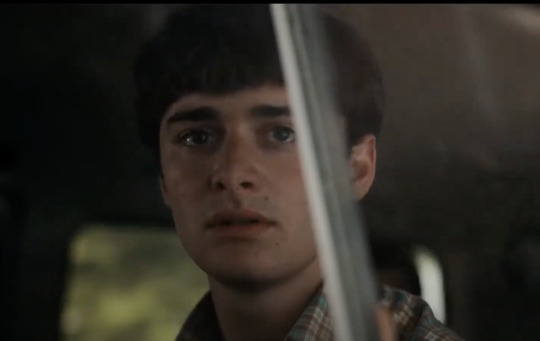
I’m reading Story by Robert McKee, a book about screenwriting. The author describes Inciting Incidents - events that set a story in motion. Isn’t this something byler v. mileven fans always argue about? Was it Will’s disappearance, or El sending Henry into another dimension, that is the Inciting Incident of Stranger Things?
Seems pretty obvious, but let’s break it down for fun.
The screenwriting book lists the prerequisites for an Inciting Incident. It is the first in a series of story events, followed by Progressive Complications (ooh!) Crisis (ah!), Climax (OMG!), and Resolution (phew).
Sorry, I'm afraid I won't be taking questions on the genuine academic theory that classical story structure resembles the male orgasm at this time.
According to my man Robert McKee...
1. The inciting incident radically upsets the balance of forces in the protagonist’s life. It must happen to the protagonist, or be caused by them.
So I suppose for many who think El is the main character, then her sending Henry packing into another dimension could technically work on this point. She actively changes the narrative.
2. The main prerogative of the protagonist is, as a result, to restore balance to how things were before the Inciting Incident happened (they may or may not achieve this).
Well, what would this mean for El? Would she want to resurrect Henry, then? Bring him back into the Rightside Up? What has been her aim, her quest, throughout the course of the show?
3. The inciting incident must happen on screen for the audience to see.
Well, we do see it, but only in flashback, many seasons after the story has begun. It seems like El yeeting VH1 to hell is instead what's known as Backstory.
Backstory describes events prior to the main narrative which influence future events, and is often shown in flashback.
4. The Inciting Incident must occur within the first 25% of your story. To find their Inciting Incident, a writer should ask themselves: how do I set my story into action?
Ah.
El sending Henry into the Upside Down cannot be the Inciting Incident, because it does not do what all Inciting Incidents must do: make the audience ask that million dollar question:
‘How the fuck is this gonna turn out, then?’
This is known as the Major Dramatic Question. It is the hook that makes the audience want to watch, planting in their mind what is known as the Obligatory Scene (or Crisis), an event the audience knows it must see before the story can be done.
It’s important to note that stories are about the extremity of the human condition. They push characters to the very limits of their possible experience, on the axis of a value, reaching the highest highs and the lowest lows. What might the value of Stranger Things be? All stories have one overarching main value, even if they have many smaller values. I think it might be Freedom/Slavery, or Truth/Lies. More on this later.
Now, if your story is a happy ending (called Idealist), the Inciting Incident might be the worst possible thing that could happen to your protagonist, a negative on the value axis, with the following story then being why it turns out to in fact be the best thing for them. Tragedy is the opposite - a great turn of events turns out to be their downfall - and an Ironic ending is bittersweet, stretching the protagonist many times between joy and tragedy, over and over, until the ending rests at a place of both happiness and sadness.
Was El sending Henry into another dimension the best or worst thing that ever happened to her? Was it THE original incident that upset the balance of her life and set her story in motion? And what would be the Obligatory Scene that results, the thing the audience just NEEDS to see before the story is done?
Many argue it’s seeing El defeat Henry for good. Sure, this is an intriguing idea, and we do need to see El's plot tied up.
But is this the greatest mystery of Stranger Things that we need answered? Really? I don’t think so. It was not the event we saw at the start of the story that set things in motion, because this particular cast of characters would not necessarily have even met El if one thing hadn’t happened.
What is the thing the audience has always been dying to know about Stranger Things? What is the Obligatory Scene the story must provide us before it can end? The thing that never quite made sense?
How, and why, Will Byers went missing.
"But El has so much screen time! She’s so bold and active! A true protagonist!" the people shout.
Well, of course we don’t have the missing puzzle piece yet. If ST is treated as one large story, then s1 would be the Inciting Incident and Progressive Complications...
... s2-s3 Progressive Complications...
... s4 Progressive Complications and Crisis...
...s5 ongoing Crisis and Resolution.
It’s also an ensemble show, with many subplots that expand off of one Inciting Incident. Will going missing is, for example, also the Inciting Incident for another beloved character.
Guess who.
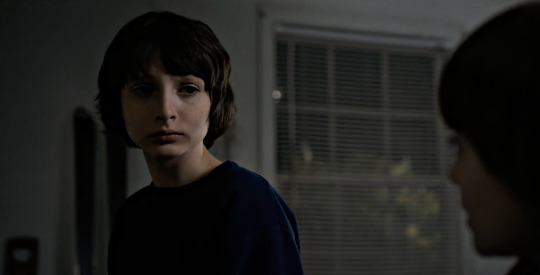
Hi Mike :)
Will going missing is an event that happens to Mike. It upsets the balance of his life and his quest becomes about restoring that balance by saving his best friend.
But by the end of s4, Will is still not safe.
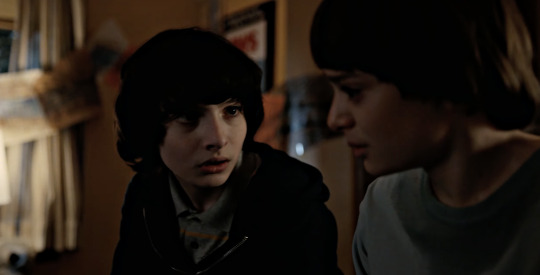
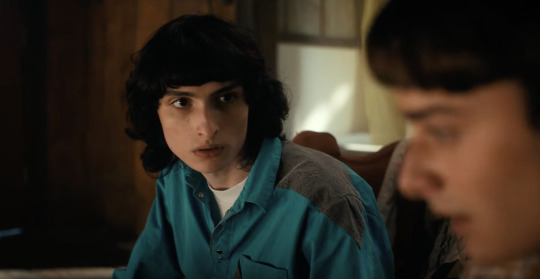
Mike still has not saved him - not really. A huge part of Mike’s quest is incomplete.
So where does Mike lie on the value spectrum of Freedom/Slavery at this point in the story? (Note that the concept of slavery is contextually appropriate, meaning 'trapped or controlled' here).
Mike's early narrative values were mostly external: having fun playing DnD with friends = positive freedom. His mom cuts their game short = negative, controlled. He isn't allowed to search for Will = double negative. Then later, Mike’s story becomes more internal and complex, with Freedom/Slavery coming to represent his place in society and inner battles in a subtle subplot. He breaks free by playing DnD, but is then trapped by his idea of being a good boyfriend, and so forth as we progress into s4.
But the very best stories push to the limits of human experience. They go beyond the positive and negative, and reach a double negative, what McKee in his book calls the Negation of the Negation. What could this be for Mike on the value of Freedom/Slavery or Truth/Lies?
Slavery masquerading as freedom, and denial - lying not only to others, but to oneself.
Mike comes from a seemingly perfect middle class suburban conservative family. It's the definition of white picket fence America. Everyone should, technically, be happy - but they aren't. If Mike continues down this road of normality, he could end up in a life where he tricks himself into thinking he has everything, but is actually in denial.
And what about Will? What’s his quest? Was being taken - his Inciting Incident - the worst thing that ever happened to him? Surely it wasn’t the best. On the value axis of Freedom/Slavery, he was captured - a negative value. If Will’s story is not to be a tragedy, his quest must be about how his vanishing will turn out to be something good in the end. And as Stranger Things will be a bittersweet (Ironic) ending, this Inciting Incident will turn out to bring both happiness and pain for Will.
So in what way could going missing have been a blessing in disguise for Will, allowing him opportunity for growth? What positive values could come about on the potential axes of Freedom/Slavery and Truth/Lies?
Will is enslaved by his secret - his sexuality - as well as by the shameful trauma inflicted on him by the creatures of the Upside Down, a possible metaphor for abuse. He experiences brief moments of freedom - positive value - when he is rescued, when he plays with his friends, and when he escapes the supernatural in California, but his sexuality secret remains - negative value.
But what is the Negation of the Negation for Will?
It's remarkably connected to what Vecna's ultimate goal is. Vecna wants to control the world, forcing people to live under a tyranny that he deems ideal, even if no one else wants it. He apparently wants to free people, but all he would be doing is enslaving them.
For Will, slavery masquerading as freedom could take the shape of Vecna trying to manipulate him into joining him, forcing Will to live in a form of denial where he accepts he can never have the freedom he craves.
Now, it’s important to note that while Will is a seemingly passive protagonist, he is in fact not passive at all, because his actions and choices have profound effects on the narrative (such as the painting lie, his choice to fight back against the Mindflayer in s2, etc), making him an active character.
And this is when I came across something very interesting in my screenwriting craft book.
A film called Ordinary People was mentioned. It’s a social drama about a family with a dark secret. The son has psychiatric problems and is freshly home from hospital. His mother is cold and resentful towards him, and his father is the passive, kindly man who wants everything to be right. There are two plots: the central plot, and the subplot. But the two are often mistaken.
People think the main plot is about the mentally unwell son, who has been despairing ever since the death of his brother in a boating accident.
His story is action-driven and draws the audience's eye with big emotion, a plotline given more screen time and more emphasis, leading people to think it is the crux of the story.
But the main plot, the central plot, actually belongs to the father - quiet and seemingly passive, he is the spine of the story. And because he is so quiet, the writer chose to do something highly unusual: to build the main dynamic of the film around the subplot, foregrounding the young son’s despair at the loss of his brother and how this rends the family apart, while subtly increasing the momentum of the main central plot in the background; that of the father figuring out what actually caused his family to fall apart.
I won’t spoil Ordinary People for you. But I found it very interesting when my hunch was confirmed and I found that this movie, this simple domestic social drama, was included on the Duffers brothers’ s4 film inspiration whiteboard.
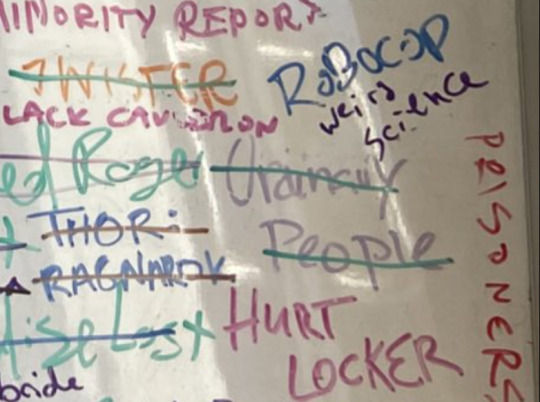
So, in Stranger Things, what could be the hidden central plot? Who could the main character be, even if they are quiet and seemingly passive? What was the true Inciting Incident of this story, the thing that set everything in motion, sparking a burning question that the audience needs answered?
And is Will capable of restoring the balance? Is this his quest - to reclaim his childhood? Is this what he truly wants?
Or is he in fact on a journey towards an 'Ironic' ending, both happy and sad, where he learns that his unconscious desire - what he actually needs - is something else entirely?
And how could the Inciting Incident - being taken - actually turn out to be the best thing that ever happened to him?
Could it, somehow, give him the courage to finally grow and reclaim power over his own life? To turn the Freedom/Slavery axis back to positive? Could Will not only gain the courage to live truthfully, but gain a double positive, and receive the thing he's too hopeless to actually want for himself?
Will thought he wanted to have his childhood back, but perhaps what he secretly wants is to grow up. To grow up into his true actualised self, a gay man, free and able to love and be loved in return.
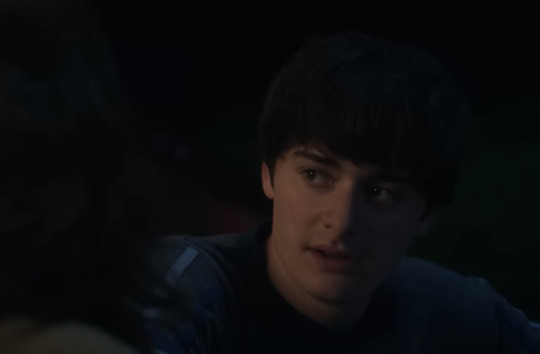
And Mike? If his Inciting Incident was losing Will, then could that also turn out to be the best thing that ever happened to him? Mike says befriending Will was the best thing he's ever done - but that might not have been enough to make him confess his feelings had they both lived relatively normal, untroubled childhoods.
But losing Will? And potentially losing him again in s5?
That might do it.
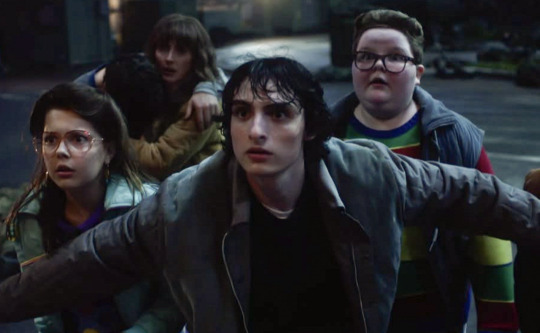
Mike’s quest, his conscious desire, his want, has been to save Will. Maybe it's also to be saved, from his humdrum life.
But perhaps what Mike needs is not just someone to save (Will), or to be saved by (El).
Perhaps, deep down, his unconscious desire is to find the courage to be able to save himself. To be his own superhero, the paladin from his fantasy games. To live a life unchained by the expectations of society - a life of freedom and truth.
Byler has a beautiful symmetry to it not because it’s the restoration of original balance before the Inciting Incident - not because it’s what the characters have spent the entire show thinking they want - but because it has the potential to be the perfect Resolution; the unexpected outcome that neither Mike nor Will consciously let themselves need.
Of course, they would both have to weather terrible losses as well - this will be a bittersweet 'Ironic' ending, after all, and the Obligatory Scene might well be a showdown between Will and Vecna, but Mike and Will coming together romantically would certainly be an event of irrevocable change, something that upheaves the characters’ worlds and not only restores, but renews them, ending their quests and rearranging their lives in a way that the audience knows can never be undone.
In other words, the end of a story.
#byler#byler analysis#byler theory#stranger things#st5#stranger things 5#inciting incident#will byers final girl#mike wheeler#main character#mike queerler#screenwriting#mike wheeler analysis#will byers character analysis
430 notes
·
View notes
Text
A new boat from the Freedom Flotilla is setting sail!
Here is what you need to know: On board are 18 passengers from 8 different nationalities, carrying humanitarian aid and a clear objective — to break the humanitarian blockade imposed on the Palestinian people.
The boat, named Handala, is taking over from the Madleen, which was illegally seized by the Israeli army in June. Having departed from Syracuse on July 13, it is currently stopping in Gallipoli, southern Italy, for concerts and public gatherings. It will set course for Gaza on July 18.
Among those on board:
Chris Smalls, Amazon labor organizer in the United States
Bob Suberi, an 82-year-old Jewish-American peace activist
Gabrielle Cathala, French MP from La France Insoumise
Emma Fourreau, French MEP from La France Insoumise
Jacob Berger, a Jewish-American influencer and outspoken critic of the Netanyahu government
Huwaida Arraf, Palestinian-American lawyer and activist, survivor of the Mavi Marmara attack in 2010
Several international journalists and humanitarian workers
The Handala will carry in its hold food supplies, infant formula, medical equipment, and more.
Originally a Norwegian trawler, the vessel has been renamed in tribute to Naji al-Ali, a Palestinian cartoonist assassinated in London for his fierce opposition to Israeli colonization. For over a year, the Handala has traveled across Europe to raise awareness of the ongoing blockade in Gaza — from Norway to Malta, via Glasgow, Rotterdam, and Brest — a living symbol of international solidarity.
In June, the previous Freedom Flotilla vessel, the Madleen, attempted to reach Gaza. Among those on board were Rima Hassan, Franco-Palestinian MEP, and Greta Thunberg, to name just two. The boat was illegally intercepted by the Israeli navy in international waters. Its passengers were detained for several days and then deported, without any meaningful reaction from either the European Union or France.
During the Madleen’s seizure, neither France nor the EU took concrete action to protect the passengers, despite their unlawful arrest in international waters. This silence must not happen again. This time, we must increase pressure on French and European authorities. Their safety depends on our support.
We must sustain the pressure, amplify communication campaigns, and follow the official accounts on Instagram (@emma.fourreau, @gabrielle_cathala, @gazafreedomflotilla) and other platforms . And if the Israeli army were once again to target them: we must take to the streets and say: enough.
In the face of genocide, blockade, and the complicit inaction of European governments, it is citizens, activists, elected officials, and union leaders who are taking a stand. All my support goes to the passengers of the Handala. May the sea protect you from colonial violence, and may your message cross all borders.
Free Palestine.
#help palestine#palestine news#all eyes on palestine#palestine fundraiser#save palestine#free palestine#i stand with palestine#gaza genocide#free gaza#gaza#handala#freedom flotilla#madleen#greta thunberg#rima hassan#Chris Smalls#Bob Suberi#Gabrielle Cathala#Emma Fourreau#Jacob Berger#Huwaida Arraf#Naji Al Ali
31 notes
·
View notes
Text
Excellent analysis
ST s2: how costumes mirror character arcs and personalities
On my rewatch I noticed that in s2 a lot of characters dress up and the costumes always tell a story.
Steve and Nancy: Joel and Lana
Steve and Nancy are dressed up as Joel and Lana from Risky Business (1983).
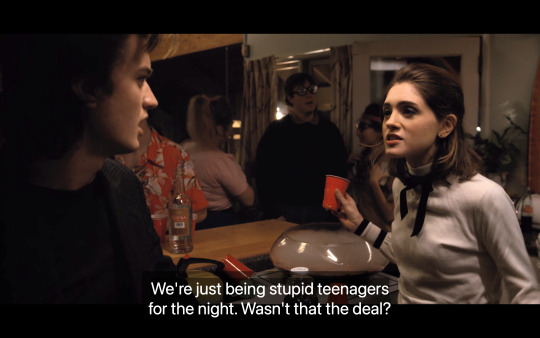

They've been planning their outfits for some time:
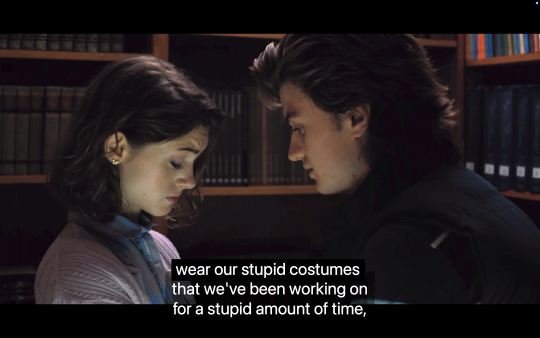
A cute couple look, you'd say?
WRONG The movie is about a rich high school boy Joel who meets a hooker (a call girl) and they organize a brothel in his house (that's presented as Joel's character's growth, he became 'an entrepreneur', got a stupid amount of money becoming a pimp, yay). They part ways in the end (She was also lying to him throughout the movie and orchestrated his house robbery) (Just like Nancy was lying to Steve about her feelings and they separated)
We know that Nancy's a fan of Tom Cruise.
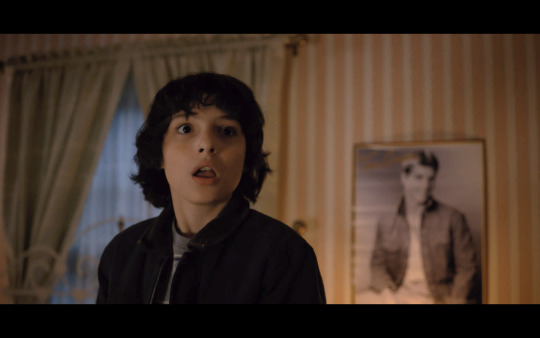
Of course she would like the movie. But actually choosing the character of Lana is OOC for her. Unless Steve has chosen their outfits!
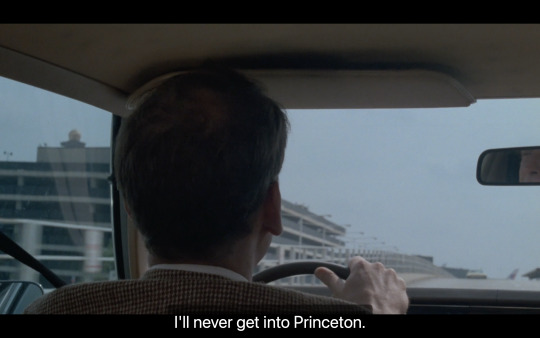
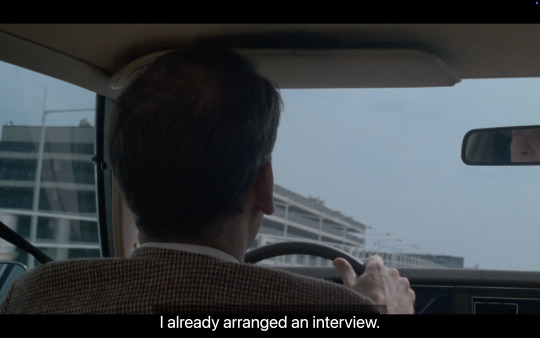
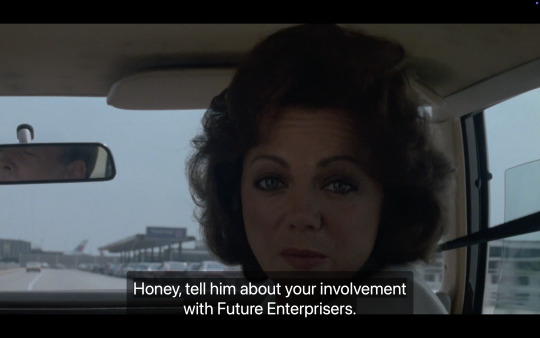
Joel is a lot like Steve: a popular guy, rich parents who dictate his future, strict house rules. I can totally imagine Steve making Nancy dress up as Lana because he saw himself in Joel.
2) Joyce and Bob: Mina and Dracula
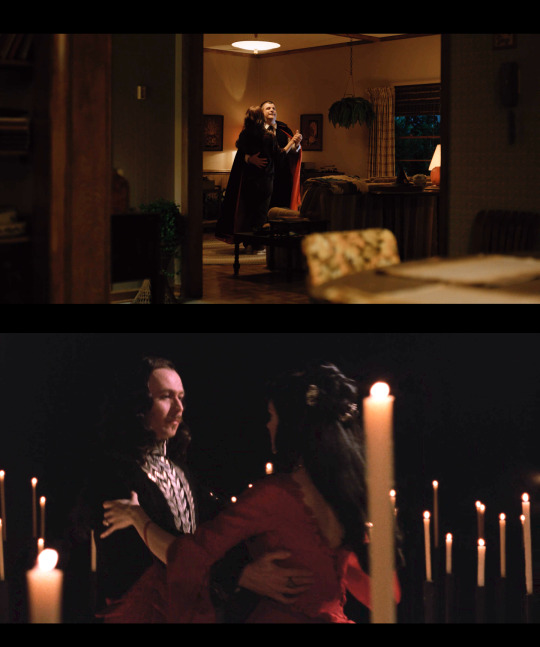
Winona Ryder played Mina/Elisabeta in Bram Stoker's Dracula (1992) and the Duffers (nerds!!!) couldn't resist referencing this scene. (NERDS)
Plot-wise, Mina and Dracula were a thing in this movie with Mina loving her husband Jonathan and Dracula at the same time. A possible hint at a Bob-Joyce-Hopper love triangle.
Dracula also dies in Mina's arms. Foreshadows Bob's death at the end of the season.
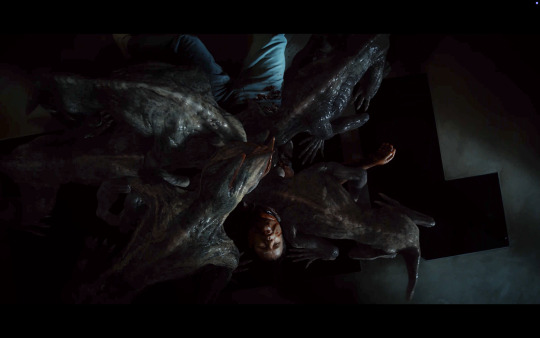
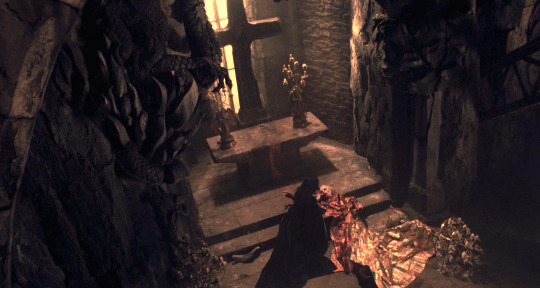
3) the Party: Ghostbusters
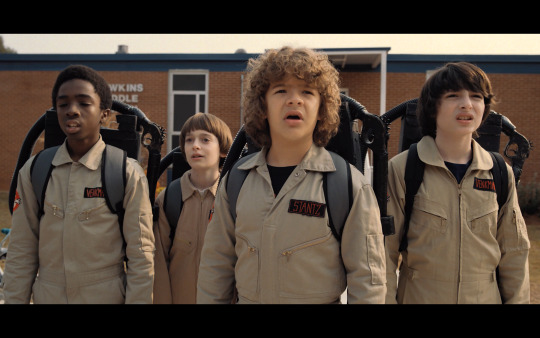
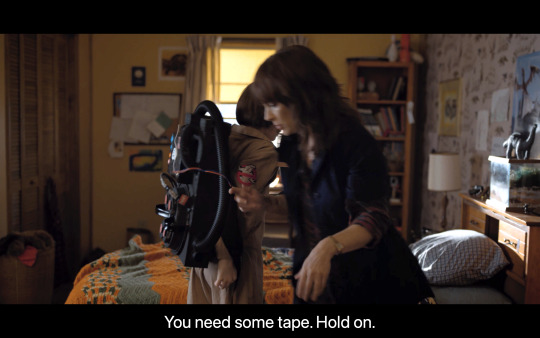
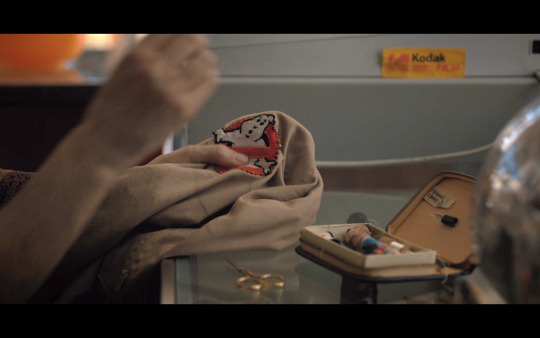
Juxtaposition.
Will's costume is handmade while Lucas, Mike and Dustin's are store bought. A classic reminder of how different their social backgrounds are.
Two Venkmans:
The continuation of Lucas/Mike 'rivalry' in the Party. Lucas and Mike are both striving for leadership. They are compared and contrasted throughout the whole show. Sharing the role of Peter Venkman in the group is a metaphorical way of showing this (Dr. Peter Venkman was the leader of the Ghostbusters).
In season 1 Lucas was against El being in the Party while Mike was actively trying to advocate for her. Season 2 switched their dynamic – now Lucas is the one who wants another girl (Max) to join their Party. Dustin also calls Mike and Lucas best friends (s1) separating himself from the two and highlighting their roles in the Party.
2. Nobody wants to be Winston. Being a black guy in the 80's in a small Indiana town was a shitty experience: casual racism and casual slurs were very common. s1 was more open in that department, s2 is more subtle. However, this lays a foundation for the later Billy/Lucas conflict.
Worth mentioning: the obvious 'possessed love interest' (Will/Max) interpretation of the 'Two Venkmans' scene.
4) Max: Michael Myers
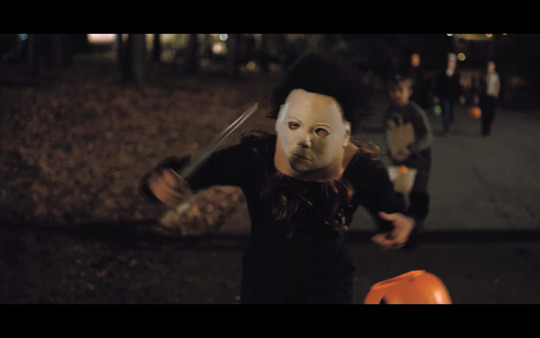
This one is particularly interesting because at the end of Halloween II Michael Myers 'dies': Laurie, the main protagonist, shoots him in both eyes blinding him and then he perishes in fire. In Halloween IV we find out that Michael didn't die and was in a coma for 10 years.
Crazy how they thought everything through...
5) El: The ghost costume
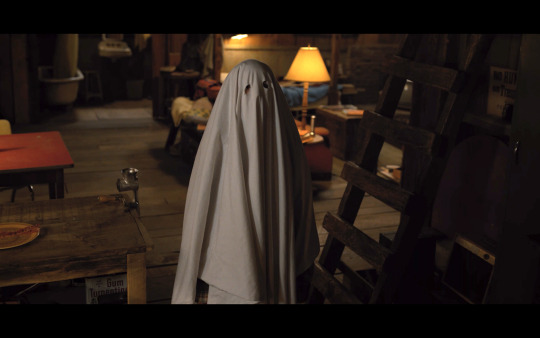
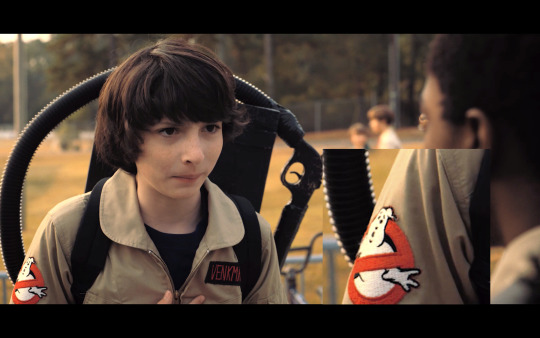
We get it, they are incompatible. No 'ghosts' for Mike.
El's arc that season reminds me of 'ghosts' as well.
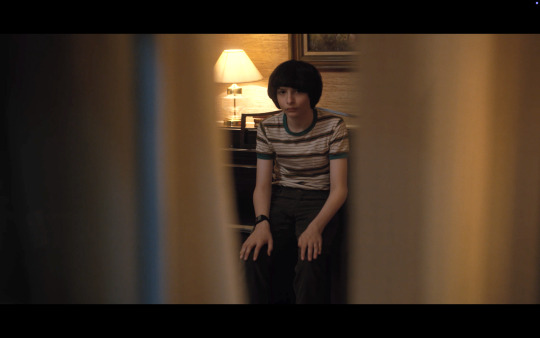
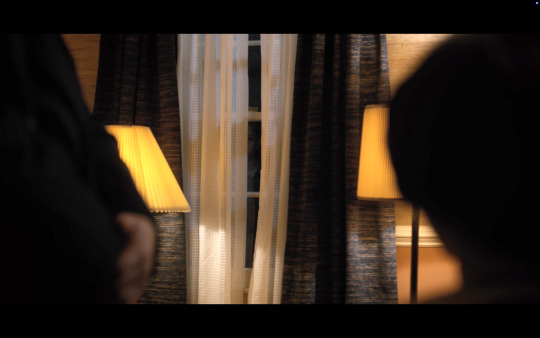
She's barely seen (if not at all) but her presence is felt.
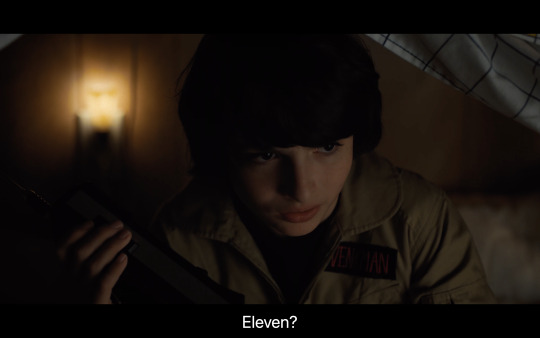
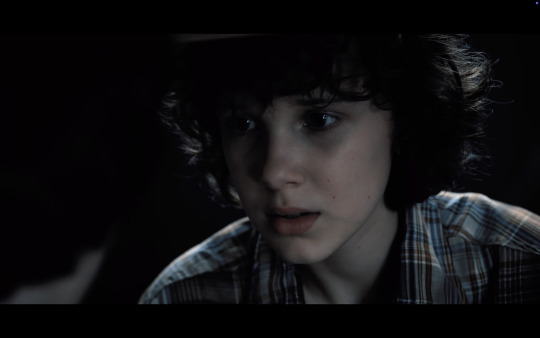
Her ghost costume is also a reference to E.T.

6) El: the Kali makeover
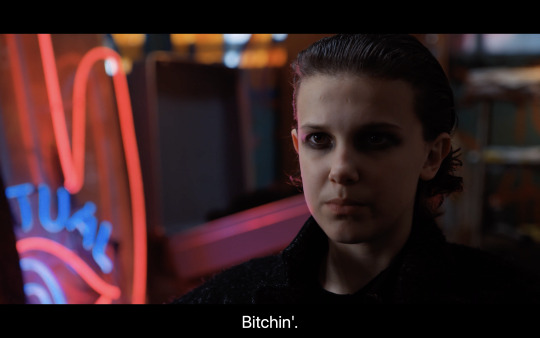
El's character arc is about her identity, she wants to find out who she is as a person: is she Eleven, a lab kid? is she Jane? is she one of Kali's bandits? or someone else?
Throughout the whole show she's trying to find the answer and her outfits show that path.
The 'bitching' look definitely doesn't match who she is at her core. She's still a child who was dressed to look like an adult (or an MTV punk, if you will)
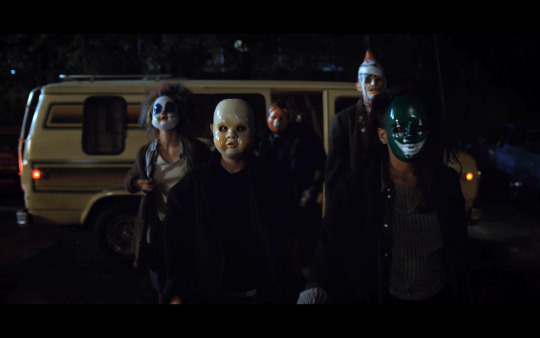
The baby mask that El wore is proving the same point.
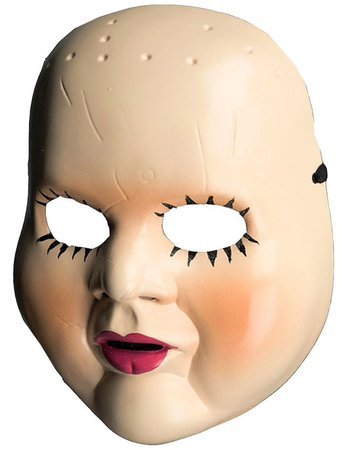
The mask is literally a baby with makeup. Fitting, right?
7) Snow ball: the Party
This one is ... weird. We all know the fact that the Snow Ball outfits might show the boys 'future careers'.
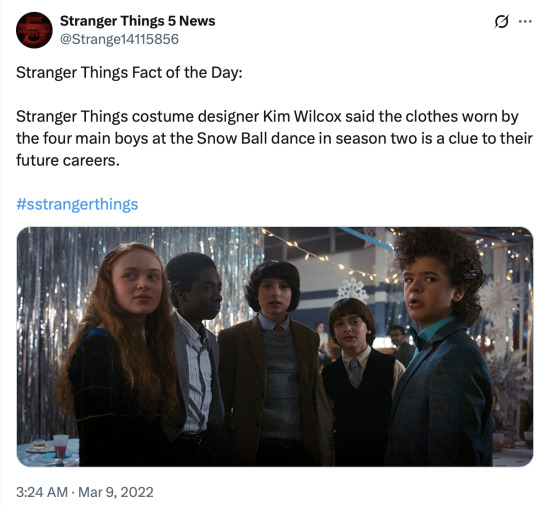
But is it even true? The only piece of information I found is this bit from an interview with Kim Wilcox, s2 costume designer.
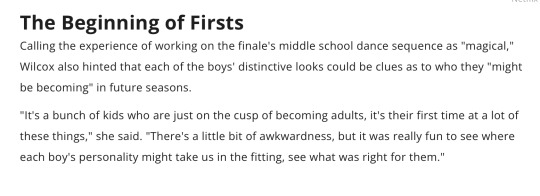
The way I see it, 'might be becoming' refers to their personalities and how they gradually mature and find their sense of self. Not their actual 'future careers'.
The outfits also show their role models at the time: Dustin is copying Steve (the hair), Will is dressed like Mr Clark.
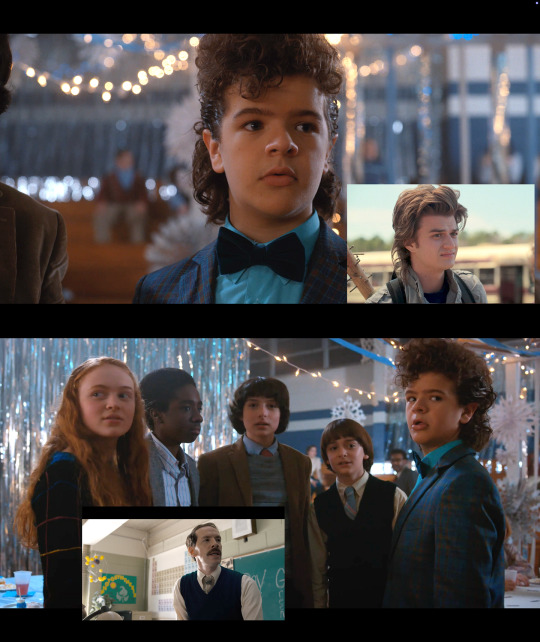
Of course, there are other possible inspirations and references but these two are the most obvious.
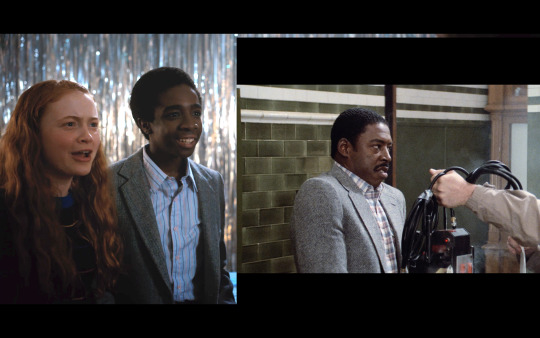
Remember 'I specifically asked not to be Winston' line? Lucas' grey jacket and shirt remind me of Winston lmao.
8) Snow ball: El
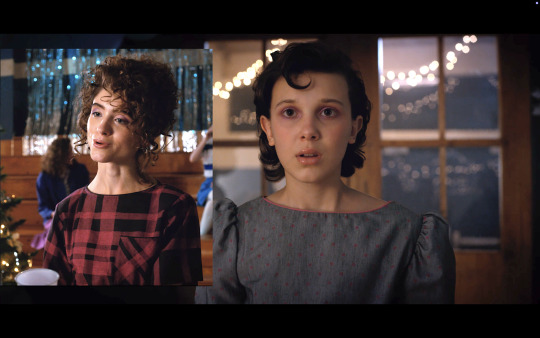
El is literally dressed and styled like Nancy: the same eyeshadow and lipgloss. She's probably wearing Nancy's dress.
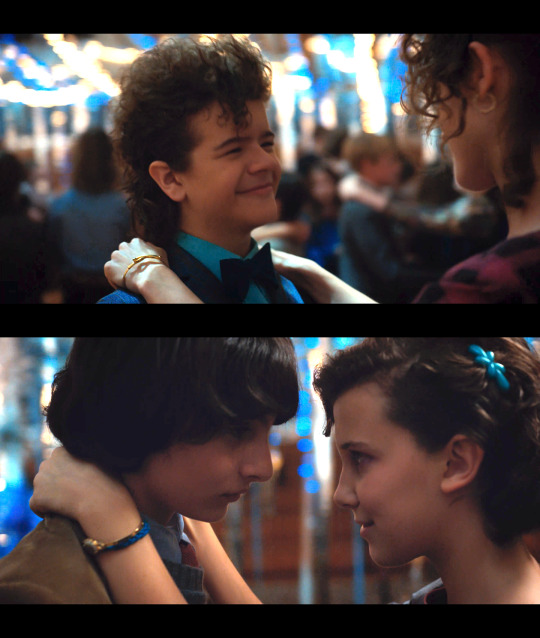
El and Nancy are both wearing golden bracelets on the same arm. Nancy probably gave El the clothes and helped her with makeup. Familial parallels never end with Mike and El and we love to see it.
Worth mentioning: Hopper finally gave El the hair tie symbolizing him moving on from the loss of Sarah.
TLDR: The Costume Department rocks!
#ooooh great finds#very interesting#st rewatch#stranger things#thirddufferbrothering#kinda#byler#mike wheeler#will byers#stranger things analysis#byler is real
460 notes
·
View notes
Text
I’ve seen the argument repeated many times: “Mike can’t break up with El—he would hurt her.” But aside from the fact that some of El’s most joyful, liberated moments were during her time with Max, particularly after she broke up with Mike in Season 3, I find it hard to understand why Mileven shippers seem incapable of imagining a world where El and Mike could simply remain friends.
As I’m currently reading @miwiheroes’ brilliant thesis—which I highly recommend to any Stranger Things fan—I found myself revisiting a question I’ve likely asked many times before: why do so many people, like Milevens, assume that two people who are unhappy in a romantic relationship cannot thrive as close friends instead? I’m genuinely curious and a little baffled by this refusal to even consider that possibility, especially since any adult, with enough life experience, would likely confirm that such a transformation is not only possible but often healthy and mature.
I even have a concrete, personal example. Back in the 1980s, my mother was in a long-term relationship with a man named Daniel. They were together for several years, deeply in love and incredibly complementary in many ways. But the relationship was still painful—mostly due to Daniel’s infidelities. My mother suffered tremendously from that, even though Daniel, despite his flaws, was (and still is) a genuinely kind and gentle person. His infidelity stemmed from his own insecurities and ego issues—not from a lack of affection. But love wasn’t enough to make the relationship functional, and eventually, after several breakups and reconciliations, my mother left him for good.
Not long after, she met my father at a party. Over the following weeks, they fell in love. But Daniel wasn’t ready to let go. For a while, my mother found herself torn between her unresolved history with Daniel and her new, growing love for my father. It was a messy, emotionally charged time—filled with confusion, fear, back-and-forth dynamics, and uncertainty.
At first, Daniel resented the fact that my mother was moving on. But over time, he matured. My parents chose not to hold any bitterness toward him, and they allowed time to do what it often does—heal and soften the past. Today, Daniel is one of our family’s closest friends. In fact, I affectionately call him my “Black dad” (a nickname he humorously insisted on claiming himself, just to be clear—before anyone accuses me of being racially insensitive, I want to be upfront about that because I know how easily things get taken out of context online). Sometimes, I even call him my “second dad.” My entire family—my mother, my father, my sisters, and I—are also very close to Daniel’s children. We support each other like family, even though we’re not bound by blood.
And all of that has unfolded within a completely platonic relationship between my mother and Daniel. That’s the point I want to make. As a child and teenager, whenever I told friends about Daniel’s role in our life, they would often be shocked or even disturbed: “I could never be friends with my ex!” or “Your dad must be incredibly secure!” And yes, my dad is incredibly secure—but more importantly, my mother always told me she didn’t regret her years with Daniel. Despite the pain caused by his betrayal, there were also moments of joy, laughter, and growth. And even if she was no longer in love with him—and even though they were clearly unhappy as a couple—she couldn’t imagine a life without him in it. He became a precious friend. As she put it, “We were ultimately meant to be friends, and that’s a beautiful thing.”
So I can’t help but ask—why are Mileven shippers so convinced that Mike and El can’t be anything other than a romantic couple? When, in truth, the majority of their genuinely joyful and authentic moments together occur when they are not in a romantic relationship—mostly in Season 1 (where even their first kiss felt more like mimicry than genuine romantic intent, especially considering Mike was emotionally disoriented), during their reunion in Season 2 (which was emotional but platonic), and throughout Seasons 3 and 4 whenever they’re not functioning as a couple.
Honestly, 90% of the scenes where Mike and El are in a relationship are filled with tension: lies, misunderstandings, performative affection, and a sense of pretending to be people they are not for each other. The remaining 10%? Soulless make-out sessions devoid of emotional depth or mutual interests. El shows no real care for Mike’s love of music or D&D, and Mike never stops to wonder what El truly enjoys beyond waffles.
And seriously—I think even a large portion of the general audience would agree, based on what I’ve observed both online and in real life: Mike and El work far better as friends. It’s no coincidence that their dynamic begins to fall apart the very moment they officially become a couple—and continues to unravel from there.
#stranger things#mike wheeler#will byers#stranger things analysis#stranger things theory#mike wheeler analysis#eleven stranger things#eleven hopper#heteronormativity#conformity#byler
69 notes
·
View notes
Text
"That is ONE thing being gay. But you LIE and claim it's "everything" because ONE thing is too much for you"
the perfect summary to describe their systemic and internalized homophobia
"you just make everything gay" oh do we?? thats so funny. crazy how no one is anticipating lucas dumping max to be with dustin then.
no one has 300 slides proving that ted wheeler is gonna divorce karen for lonnie. or that jonathan is going to break up with nancy so he can be with argyle. & have you ever seen hour long video essays going through hopper and murray's relationship and screaming endgame!! endgame!!! he's not in love with joyce!!! because i haven't.
maybe u just hate that we wouldn't be doing this at all if mike acted different. if mike's actions were platonic we'd more than likely see them as platonic.
#stupid people#just because will and mike are gay doesn't mean every character is gay#like that's so stupid#fr#gay#gay gay gay gay gay#stranger things#byler#boo#i said gay#why u so scared
1K notes
·
View notes
Text
I'm so in love of your analysis you are genius I could read you 24/7
Why I think the flashback scene in ST5 is about Lonnie (and Mike and Jonathan's complicated relationship...)
CW: This post discusses potential spoilers and mentions implied abuse (It's about Lonnie, after all...) proceed with caution!
So, we already know about the casting call for a scene featuring 8-year-old Mike and Will, and 13-year-old Jonathan.
I've had multiple thoughts about what this scene could be (so many possibilities!) but after reading a leak regarding this scene, I've finally settled on (an admittedly speculative) theory.
(Of course, not all leaks are accurate, so take this with a grain of salt. And if you’re avoiding spoilers, consider this your cue to stop reading!)

Based on the leak, here’s what we know about the scene so far:
It is not a supernatural or horror-based memory (unlike Will’s 1983 flashbacks of the Upside Down).
It takes place on a school set (likely Hawkins Elementary, which makes sense if they’re reusing sets e.g. Holly Wheeler’s school).
The scene includes multiple parallels to Season 2.
This made me wonder: what Season 2 themes involving Mike, Will, and Jonathan could be echoed here—without needing the supernatural?
It’s difficult to answer because Will’s entire plot in Season 2 revolves around the supernatural. Namely, his possession by the Mind Flayer. But if this flashback isn’t supernatural, maybe the show is drawing on what the Mind Flayer represents: trauma, fear, and abuse.
The Mind Flayer as an allegory for trauma and PTSD
I don’t need to make this section long—most fans are acutely aware that the Mind Flayer is associated with trauma and PTSD. This is supported by the fact that these hauntings begin when the anniversary of Will’s abduction approaches, and that Will is diagnosed with PTSD by Dr Owens. The only thing that people may need convincing of, is that the Mind Flayer (and Upside Down) serve as allegory not just for trauma, but for Will’s specific trauma concerning his father. @greenfiend has an excellent series which delves into this theory.

Will is good at hiding
Season 2 also clearly shows us what Will's primary trauma response is: He initially freezes, be he also runs and hides. The way Will ran and hid behind the stairs on Halloween seemed practiced to me. Like he had done this before. He doesn't panic, and he doesn't keep running. He chooses to close his eyes and hide in a self-soothing position.
In fact, Jonathan himself has said that Will is good at hiding:
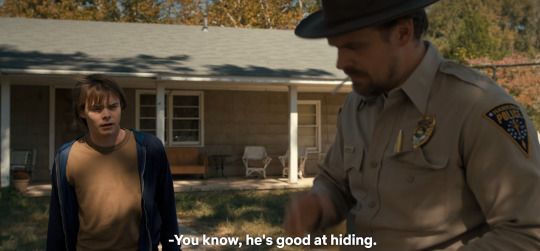
He wouldn't know this if he hadn't witnessed Will hiding before. In fact, Will being good at hiding implies he is also difficult to find.
It would make sense for us to see this play out: Will hiding, and Jonathan attempting to find him. And if Mike is also there, and we're paralleling Season 2, then that means...

Mike is good at finding
Despite Will being good at hiding, Season 2 also showed us that Mike is good at finding him. There are three Mind Flayer associated scenes in which Mike is the one to find Will, and in two of them, he's also the one who breaks him out of the visions.
He spots him outside the arcade:
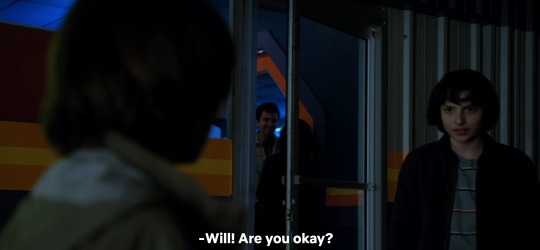
He's the first to find him at Halloween: "I couldn't find you!"

And he's the first to find Will outside Hawkins Middle on the field: "I just found him like this!"

The 1979 Theory
If we're able to acknowledge that the Mind Flayer serves as an allegory for trauma and PTSD, then the gates which allowed the Mind Flayer to penetrate Hawkins (and Will by extension) are also relevent.
Interestingly, the first gate was opened by El in 1979. In this flashback—if Mike and Will are aged 8 years old—that means it also takes place in 1979.
I've made a fairly visual (rather than analytical) post about what I think may have happened to Will in 1979 and how it parallels the Hawkins Lab Massacre.
(Content warning: while nothing is explicit, the subject matter involves implied child abuse).

TL;DR: I believe Lonnie’s abuse escalated in 1979, and it marked a significant trauma for Will—one that he likely repressed or fragmented, much like El did with her memories of the massacre. That would make 1979 a foundational year for both of them: the year their “gates” were opened.
Jonathan’s guilt (the Mike vs Jonathan argument leak)
Additonally, there is a leak which claims Mike and Jonathan will get into an argument about Will's safety this season.
If this ends up being true, I think it will feed into this flashback scene as well. Specifically, Jonathan's guilt and possible quiet resentment of Mike.
I say resentment because Jonathan has made it clear that he views Will as his best friend. He also took on a somewhat parental role helping to raise Will, despite only being 4 years older. He likely feels that Will’s safety and wellbeing is his responsibility.
However, the show has also told us that children aren’t always honest with their parents/ family, but they usually tell their friends everything:


Once again, I’ll point to my previous post about 1979, and the fact that I believe there is something concerning Lonnie’s abuse that Mike is somewhat privy to, that Joyce and Jonathan are not. Because Will told Mike things he didn't tell anyone else.
Jonathan on the other hand, is concerned and insecure that Will no longer comes to him when he needs help or advice.
He said so himself in Season 4:


Jonathan also has a track record of not being around when bad things happen to Will—or not being the one to "rescue" him—but Mike usually is:
Will was at Mike's house before he went missing, and Jonathan was supposed to be waiting at home for him. While Jonathan was focused on capturing the Demogorgon, Mike was focused on finding Will.
Will was trick-or-treating with Mike when he was chased by the Mind Flayer, and Jonathan was at a party when he was supposed to be supervising Will. While Jonathan was partying, Mike brought Will home to his place.
When Will was possessed by the Mind Flayer, Mike stayed by his side the entire time, while Jonathan met with Murray to expose the Hawkins Lab scandal.
It was Mike's memory of meeting Will for the first time that allowed Will to (partially) break out of his possession and use morse code.
None of these are Jonathan's fault, but he has clearly expressed guilt:
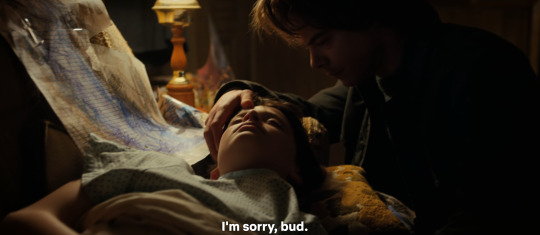

If an argument does break out between Mike and Jonathan this season, I think it will be fuelled by exactly that: Jonathan’s quiet resentment and frustration that Mike keeps “butting in,” keeps (trying) to protect Will in ways that Jonathan believes should be his responsibility.
And if emotions run high, I wouldn’t be surprised if Mike snaps back with something like, “Well, I’ve actually been there when Will needed someone. Can you say the same?”
Likewise—Jonathan, who is aware of Will's romantic feelings for Mike—would find that quite rich coming from him, as he's witnessed his brother's heart break.
So for Mike to throw Will’s emotional well-being back in Jonathan’s face? That would cut deep. It would feel hypocritical. And that’s what would make the fight so compelling—two people who love Will deeply, clashing over how to protect him, while unknowingly tearing open wounds they both helped shape.
In this post I point out that Mike and Jonathan's "heart-to-heart" conversations with Will in ST4 were very similar: they were both seeking reconnection with him and expressing concern that they have become distant.
This tension will culminate in Season 5.
How it culminates (my actual theory regarding the flashback)
I speculate that the flashback will show Jonathan arriving at Hawkins Elementary to pick Will up from school, only to find out that Will isn’t where he’s supposed to be. But not because he got lost—because he’s hiding.
The reason why Will is hiding may not be explicitly stated, but it's because he's scared to go home—scared to see Lonnie.
Jonathan will search for Will, but it will likely be Mike who finds him first, or Mike who is already with him (and alerts Jonathan).
Mike also might already have an inkling as to why Will doesn’t want to go home. Because friends don’t lie. Because friends tell each other things they don’t tell parents.
He might even offer to let Will come stay at his place—a callback to what he does years later in Season 2, when he says he’ll "take him home" and brings him to the Wheeler house instead.
This flashback will be seen from either Mike or Jonathan's perspective, as Will's memories of 1979 are likely spotty. It will also highlight the dynamic between the three: Jonathan and Mike are both similarly protective of Will due to their affection for him. But this also creates wounds:
Because Mike feels helpless to protect Will from harm, even if he is always there for him, and Jonathan is frustrated by Will's habit of repressing and hiding his pain.
Well, that's my theory. What do you guys think the flashback scene will be about?
#st5 speculation#will byers#stranger things#mike wheeler#jonathan byers#st5 theory#lonnie byers#byler#stranger things analysis#byler analysis#st5 spoilers#stranger things theory#st5 leak#st5 leaks
438 notes
·
View notes
Text
"Seeing Will Byers receive romantic attention from another male character would serve as a reminder to the audience that Will is desirable and that he has options—this increases the stakes for Mike. The GA will start wondering if this is really Will's endgame, and if he is truly ready to get over Mike. The GA, especially those who never shipped Byler before, may find themselves unexpectedly invested. They might even feel disappointed or sad at the thought of Will "moving on." It also creates space for the writers to show us jealous Mike. Just as we've seen jealous, longing Will, a temporary love triangle allows us to explore Mike’s feelings through that same lens of romantic insecurity. This brings the possibility of Byler to the forefront of the GA's subconscious. At the same time, it invites them to root for Mike, and therefore Byler."
I can't be more agree than this !!!
There's a real possibility we get a Will Byers centric love triangle in ST5
We know the Duffers love a good love triangle.

So much so, they've given us one (or several) in every season of Stranger Things thus far—and I don’t think they’ll break that streak in Season 5.
One thing I’ve noticed is that while some love triangles stretch across multiple seasons (like Steve/Nancy/Jonathan), the writers also introduce at least one new triangle each season.
Here’s a quick breakdown:
S1: Steve / Nancy / Jonathan S2: Steve / Nancy / Jonathan + Joyce / Hopper / Bob + Lucas / Dustin / Max S3: Robin / Steve / Tammy + Joyce / Hopper / Alexei + Joyce / Hopper / Mr Clarke S4: Steve / Nancy / Jonathan + Mike / El / Will + Robin / Vickie / Vickie's ex-boyfriend S5: Steve / Nancy / Jonathan (likely resolved) + Mike / El / Will (will come to a head) + ???
Sometimes they’re played straight, but the writers also love to openly mock the love triangle trope, too—especially in Season 3:
For example, Hopper gets irrationally jealous over Joyce talking to Mr Clarke and even Alexei—prompting Joyce’s sarcastic line about how every man she talks to must be her boyfriend. And of course, there's Steve wrongly assuming Robin has a crush on him, then confessing to her, only to find out she actually liked Tammy Thompson.
Basically, there’s no one way the writers use this trope. They clearly enjoy it—but more importantly, they enjoy subverting it.
So, call me delusional but I think it's likely that we could be getting another Will Byers love triangle in Season 5:
He's the main character of the season and his arc will (partially), revolve around his "coming of age" and acceptance of his sexuality, after all.
Will has consistently been portrayed as someone who is considered attractive or desirable in-universe. In every season except Season 3, a girl shows interest in him despite his nerdiness and perceived queerness.
And now, it looks like the Duffer Brothers are visually rebranding him as a romantic lead:
His new hair and costume design feels both heroic and boyish. The flannel—once a staple of his wardrobe and a symbol of his innocence—is slowly being phased out, suggesting a gradual loss of that innocence. However, he’s still buttoned up. That tells me Will is stepping into his manhood (and by extension, his sexuality), but he's still holding something back. He's going to need to be pushed out of his comfort zone; both physically and emotionally.

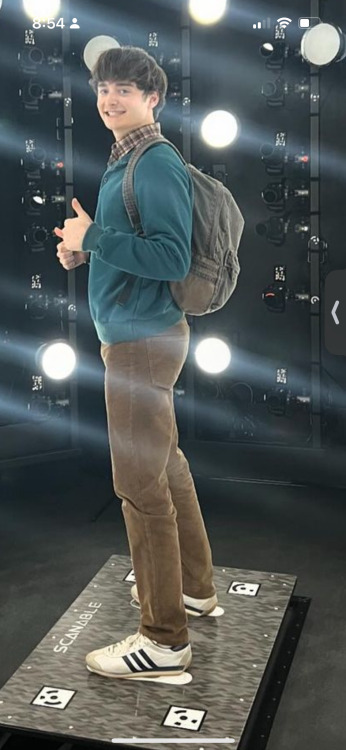
Even narratively, there are established links which hint at a possible non-Mike love interest:
When we look back at Will’s comment about not falling in love, we often read it as foreshadowing his feelings for Mike—or hinting that he already is in love with him. But I also interpret it as something more: Will doesn’t believe he will ever inspire love (or romantic attraction). He sees himself as undesirable.

Think about the four original members of the Party. Yes, they’re all considered uncool nerds to some degree—yet three of them are affirmed through romantic connection: Lucas has Max. Dustin has Suzie. Mike has El. They each receive validation and the feeling of being wanted.
Will does not.
And yet, the writers have made a consistent effort to show us that Will is considered attractive—despite his belief that he isn’t, and despite the lack of romantic validation he receives. That creates a real disconnect. A kind of cognitive dissonance.
Having Will repeatedly receive attention from girls—only to reject them or appear disinterested—was an effective way to subtly hint at his queerness. But it’s happened so many times now, that there needs to be a payoff.


What is the long-term point of making the canonically gay kid, who already believes he’s undesirable, only receive interest from women?
Er, there isn’t one.
It makes sense, then, to give Will the opportunity to experience mutual same-sex attraction with someone who isn't Mike.
Because Will's arc about accepting his sexuality doesn't just have to culminate in the realization that Mike loves him too (as sweet as that is).
It should culminate with the knowledge that queerness is valid, that he is considered desirable and worthy of romantic interest, and that he isn't alone in experiencing queerness.
Additionally, as mentioned above, Will is already perceived as queer—he’s been bullied for it his entire life, despite never explicitly coming out. Hawkins is a small town where word travels fast. So if there is another young gay guy in town, chances are… they’ve already heard of “Zombie Boy” Will Byers.
He'd certainly be on their radar: he’s good-looking, he’s mysterious, and he’s still closeted, which means he’d likely be discreet.
And let’s not forget where Will was emotionally at the end of Season 4, especially regarding his feelings for Mike:

He’s starting from ground zero in Season 5. He has zero hope that Mike feels the same way, and he’s likely going to be making zero moves.
In fact, most Byler theorists agree—it makes sense that Mike will have to be the initiator in Season 5. Will is just too emotionally shut down to make the first move.
But… wait a minute.
If this season is supposed to be about Will coming into his own as a young gay man—about self-acceptance, confidence, and owning his identity—how does that make sense if Mike is the one initiating everything?!
Well… maybe Mike needs to make the first move when it comes to Byler. But that doesn’t mean Will has to stay passive the whole season.
It’s possible that Will could gain some much-needed confidence—maybe even a bit of romantic “practice”—by taking a more active role with someone else first.
Giving Will a (temporary) new love interest would also level-out the playing field between himself and Mike:
There's a real sense of karmic justice and ironic foreshadowing in Stranger Things.
Will's jealousy of Mike and El's relationship has been hinted at for two seasons now—and he even complained that Mike only called a couple times while El had a "book of letters" from him.
What’s interesting is that even after Mike takes accountability for their argument and they make up, that specific comment—about the phone calls and letters—is never addressed. It lingers.
That’s why I think we could see a similar conversation (or even a full-blown argument) between Mike and Will in Season 5. But this time, Will might be the one receiving phone calls or letters—from someone else.
And let’s not forget: it’s possible that the Byers are temporarily staying with the Wheelers in Season 5. If Will has a secret admirer, and he’s trying to keep it quiet, Mike is going to find out. (Excellent way to manufacture drama).
I also feel compelled to reiterate that the Duffers have shown time and time again: they can handle love triangles in many different ways.
They can play it for comedy. They can make it completely one-sided or delusional—like Mike projecting his own jealousy, much like Hopper did with Joyce in Season 3. A love triangle doesn’t have to be serious or long-lasting. It could span multiple episodes, or just one. It could involve a kiss—or zero physical contact at all.
And it doesn’t have to disrupt a Byler endgame—in fact, quite the opposite:
Seeing Will Byers receive romantic attention from another male character would serve as a reminder to the audience that Will is desirable and that he has options—this increases the stakes for Mike.
The GA will start wondering if this is really Will's endgame, and if he is truly ready to get over Mike. The GA, especially those who never shipped Byler before, may find themselves unexpectedly invested. They might even feel disappointed or sad at the thought of Will "moving on."
It also creates space for the writers to show us jealous Mike. Just as we've seen jealous, longing Will, a temporary love triangle allows us to explore Mike’s feelings through that same lens of romantic insecurity.
This brings the possibility of Byler to the forefront of the GA's subconscious. At the same time, it invites them to root for Mike, and therefore Byler.
410 notes
·
View notes
Text
"...cause I love her and I CAN'T LOSE her AGAIN"
“I'm just trying to demonstrate how careless Max is with Eleven's powers. In fact, how careless all of you are. You're treating her like some kind of machine when she's not a machine, and I don't want her to die looking for the flayed when they've obviously vanished off the face of the Earth. So can we please just come up with a new plan because I love her and I can't lose her again.”
Mike’s most quoted line in Season 3 — “Because I love her and I can’t lose her again” — is often cited as definitive proof of his love for Eleven. But this statement, when viewed in full context, is a trauma response rather than a heartfelt romantic confession.
What’s hilarious is that the reason why he said that is literally in the sentence itself: the trauma. It’s ironic that this scene is being used as the ultimate proof, when in reality, it perfectly illustrates Mike’s core issue. The trauma of having watched her sacrifice herself to protect him, after he’d spent the entire first season urging her to use her powers (he literally said it in season 1 that she was a weapon). What pushed him to say this was the accumulation of all the unresolved trauma he experienced throughout Seasons 1 and 2—and that doesn’t exactly strengthen your argument, because…
The trauma begins in Season 1. Mike forms a fast, intense bond with Eleven while Will is missing. He projects his grief, fear, and protective instincts onto her.
Expanding upon the notion that trauma lies at the heart of Mike and Eleven's relationship, it's significant to note that the moment Mike kisses Eleven in Season 1 occurs on the very same day he effectively attempted suicide by leaping into the quarry—an act from which she rescued him. From that point forward, he perceives himself as entirely indebted to her. Not only had he already idealized her as his only hope of finding Will, but she now embodied the literal reason he was still alive. Layered atop this is the influence of those around him—Lucas, Dustin, and even Nancy—who had begun to suggest he harbored romantic feelings toward her. Combined with his own confused emotions, the pedestal upon which he placed her from the very beginning due to the almost mythic timing of her arrival in his life, it constructs what appears to be a perfect narrative. And as a Dungeon Master and an aspiring storyteller, Mike is especially susceptible to such emotionally charged, almost archetypal storylines. Within this context, it becomes entirely plausible that he would interpret his overwhelming emotions—rooted in trauma, gratitude, and projection—as romantic love. That this kiss occurred on the very day of a near-death experience he never references again (and may never have shared with anyone besides those present) underscores the depth of repression and denial involved. Fundamentally, their relationship is born out of mutual trauma and survivor’s guilt. It is a structure of codependency rather than genuine romantic affection. Personally, I believe that had Mike not jumped into the quarry, and had Eleven not saved him, he would not have kissed her that night.
From the moment Eleven disappears at the end of Season 1 after using her powers to save him and their friends, Mike internalizes guilt and blame. He had encouraged her to keep using her powers, to push herself, and to fight — and she seemingly died because of it. He urges her to use her powers repeatedly, culminating in her presumed death. For nearly a year, Mike believes she died because he pushed her too far, he grieved her, believing it was his fault. This established a psychological pattern of guilt and a compulsive need to protect her, not because of romantic love, but as a trauma response.
If he truly loved her romantically, he would’ve reacted with joy and emotional fulfillment at the end of Season 3, when El told him she heard what he said and that she loves him too. He would’ve kissed her back, smiled, said something, even if he was surprised. The truth of that scene is, ironically, a perfect summary of how Mike—his point of view and his emotions—is misunderstood by the other characters and also by the audience. Because he is incapable of truly communicating or expressing his emotions.
That scene is literally Mike breaking down in a full-blown panic, triggered by his unresolved trauma: the fear of loss and abandonment caused by Will’s disappearance in Season 1, El’s absence and presumed death in Season 2, the helplessness of watching Will be possessed and nearly die, the massacre at the lab (gosh let’s be honest, Michael Wheeler urgently needs therapy, I did a post cut in two part : here and here who develop more and where I was already mentioning how this scene says a lot about Mike mental health), and finally, his survivor’s guilt for having encouraged El to use her powers to the point where she “died” right before his powerless eyes. This scenario is a mirror of Season 1's climax, and Mike’s panic reveals a deep-rooted fear of repeating past events.
For a whole year, he believed he was the reason El was dead. And the very argument that triggered that line was literally about whether or not El should keep pushing herself and her powers to the limit to stop Billy—when she had already nearly died doing exactly that. So yes, when Mike says, "Because I love her and I CAN’T LOSE HER AGAIN," it's true. Because, breaking news: Mike does love El. He deeply cares about her. He feels the need to protect her. He carries immense guilt over what happened to her, which only amplifies his desperate need to protect her now and avoid repeating the same mistake that, in his eyes, led to her "death"—a death that felt absolutely real to him.
When faced with the possibility of losing El again in Season 3, Mike's fear resurfaces—not because he is madly in love, but because he cannot emotionally survive another loss for which he feels responsible (he is just 14 here remember). The panic in his voice, the overwhelming urgency of “I can’t lose her again,” reveals that it is not romantic love driving him—it is fear, shame, and unresolved grief. This is compounded by his lack of romantic follow-through when she returns. There is no joy, no emotional intimacy, no physical warmth. Instead, there is distance, awkwardness, and emotional shutdown.
But the real truth in that line isn’t even the “because I love her” part—because nothing in that moment confirms he's saying it romantically (especially since he can’t even say it to her face, can’t write it to her, and still can’t say it even after she confirmed that she loves him and heard him say it). So yes, he loves her, just like he loves Lucas, just like he loves Nancy, just like he loves Dustin.
What truly matters in that sentence is: “and I CAN’T lose her AGAIN.” And those are the words he emphasizes. Not “because I love her”—that part is rushed, buried in the flood of words he’s pouring out mid-panic. But he clearly articulates and stresses “and I CAN’T lose her AGAIN.”
Everything is shown here—not told—through his words, his body language, his tone, the context. His trauma is triggered. He’s terrified. He’s trying to prevent history from repeating itself, because the current situation feels too much like the Season 1 finale from his perspective.
So no, it wasn’t romantic love that drove him to say that. It was unresolved, ignored trauma being violently reactivated. The only difference lies in how people interpret that line—be it other characters or the audience—through the lens of heteronormativity, completely ignoring the full context and everything that follows in Mike’s behavior and attitude toward El.
It could’ve been cute, and could’ve worked in your favor—if the show had ended with that episode. But unfortunately, the Season 3 finale and the entirety of Season 4 only go on to confirm that yes, he loves her and he can’t lose her again, but he doesn’t love her romantically, and he is deeply traumatized and in need of healing from his abandonment and loss issues—or else Vecna’s going to have an easy time with him.
If Mike were truly in love with Eleven, one would expect expressions of that love to come naturally, especially in moments of emotional vulnerability. Yet, at the end of Season 3, when Eleven tells him she heard what he said and that she loves him too, Mike gives no response. He looks stunned, confused, almost empty. He does not affirm her words, kiss her back, or show any sign of romantic fulfillment. Mike’s behavior in these scenes doesn’t resemble a boy in love. It resembles a boy in distress, one who is playing a role he feels obligated to fulfill, but who cannot emotionally connect with that role.
This pattern continues in Season 4. He avoids writing “Love, Mike” (and write every time "From Mike" instead) in letters, despite knowing it’s what Eleven needs to hear. When confronted, he dodges and manipulates: “I say it”. But we, the audience (and El too), know that he doesn’t. His behavior is not that of a loving boyfriend, but of someone trapped in a role he doesn’t know how to escape from. His “I love you” speech in Volume 2 is prompted not by genuine passion, but by external pressure, specifically by Will’s emotionally charged metaphorical painting (that channels Will’s own feelings for him) and pep talk and his finally staged encouragement ("don't stop, remember, you are the heart ! You're the heart"). The words are performative, desperate, idealized—not grounded in emotional truth. He praises a version of Eleven that no really exists, emphasizing her strength and powers, not her vulnerability, her personality, or her heart. This suggests he is in love with the idea of her—an idea shaped by admiration, yes, but especially guilt and obligation, not affection (further alienating her and reinforcing that his attachment is conditional and performative).
So yes, if the only two times your boyfriend tells you he loves you are:
– once, when you're not physically present, and he says it in a panicked trauma response, then refuses to take ownership of those words afterwards,
– and the second time is only after you told him that never hearing it from him is hurting you, and you need to hear it—and instead of reassuring you, he gaslights you into thinking he says it when he clearly doesn’t, dodges the subject by idealizing you as a superhero…
…and this “I love you” only comes when you’re on the brink of death, and only because his best friend handed him a painting with a disguised declaration of love in it?
Then I’m sorry, but that’s not romance. That’s codependency, guilt, trauma, emotional repression, and societal expectations. Not romantic love.
The relationship between Mike and El has long been framed through a heteronormative lens, one that presumes emotional closeness between a boy and a girl must equate to romantic attraction. The show’s framing and marketing often push this narrative, but Mike’s behavior consistently subverts it. His discomfort with physical affection, his emotional volatility, and his failure to express romantic feelings — even when prompted — all suggest that this narrative is externally imposed, not internally felt.
The audience’s insistence on seeing “Because I love her and I can't lose her again” as a definitive romantic confession overlooks the complexity of Mike’s trauma, his guilt, and his emotional repression. It ignores the fact that he never says it to Eleven directly until forced to, and even then, it is with inauthentic language and shaky motivation. The tragedy is that Mike’s real love story — one rooted in slow-burn intimacy, shared vulnerability, and mutual understanding — is with Will. But because it doesn’t fit the traditional mold, it goes unacknowledged by both the characters and the audience.
Mike Wheeler is not a romantic lead blindly in love with Eleven. He is a traumatized boy burdened by guilt, struggling with self-identity, repressing his true feelings, and unconsciously projecting protectiveness as love. His actions toward Eleven are rooted in trauma, not desire, while his connection with Will reveals the kind of emotional intimacy that speaks to a deeper, romantic truth. Until Mike confronts his trauma and his sexuality, he will continue to play a role that does not align with who he truly is — a boy in love, not with the girl who saved him, but with the boy who always understood him.
Mike is not a character who lacks love—on the contrary, he feels deeply. But his emotional repression, unresolved trauma, and fear of loss lead him to confuse guilt with devotion, and obligation with romance. His relationship with Eleven is a product of circumstance and narrative expectation—but it lacks the emotional reciprocity, intimacy, and authenticity of true romantic love. Meanwhile, his emotional world orbits around Will, whose presence brings out the rawest, most vulnerable, and most honest version of Mike.
In truth, Mike doesn’t need a girlfriend—he needs healing. He needs to confront his guilt, allow himself to feel, and to stop hiding behind a version of love that doesn’t belong to him. Only then will he be able to understand what love really is—and who it’s truly for.
324 notes
·
View notes
Text
I don’t know if I have the right to say this, but I see so much of myself in the character of Will, even though I’m a cisgender heterosexual woman... Of course, I could never fully imagine all the struggles he goes through as a young gay teenager in the 1980s, living in a small rural town in the United States. But as someone who spent ten years of her life harboring romantic feelings for one of her closest friends from high school—constantly orbiting around each other in a space filled with ambiguity, never truly taking that step because he was always in relationships with other girls, while I was the one helping him fix those relationships, sacrificing my own feelings in the process—I know a pain that is eerily similar. The pain of being the friend who’s always there when he needs her, but whose feelings are never returned.
But more than anything, I relate to Will’s despair—the belief that I can’t fall in love, and worse, that I’m incapable of being loved. Even if the reasons are different for Will and for me. For him, it’s being gay in the 80s. For me, it’s being a survivor of physical, sexual and psychological abuse, of grooming when I was a child and a teenager. I suffer from such severe post-traumatic stress disorder that I am incapable of sleeping with a man without experiencing panic attacks, dissociation, or vaginismus—unless I’m intoxicated. Which led me, for years, into a cycle of one-night stands while drunk, trying to maintain a sexually active life even though I never really felt any pleasure. At least, I felt normal. Everyone around me was either in relationships or having active sex lives, and I just wanted to feel like I wasn’t broken. So I followed the crowd.
But… the thing is, I can’t pretend anymore. After years of depression, of not understanding what was wrong with me, the fog of traumatic amnesia finally began to lift. And with horror, I started uncovering piece by piece what I had lived through as a child. Just as I began to realize that the only love I ever experienced—at 18, with the school supervisor almost ten years older than me—was, in fact, an abusive grooming relationship. He manipulated me and violently abused me for nearly two years. And I was so in love. So emotionally dependent on him. So desperate for him not to leave me—because he always left without warning, only to come back a few days later, and it happened over and over again—that I was willing to accept anything. Whatever he did to me, no matter what it was, no matter if I didn’t want it or if it hurt or if I was confused and lost—it was better than being discarded again.
But now, here I am, completely unable to build a relationship with a man. Unable to create romantic or intimate bonds without fleeing, without self-sabotaging, without isolating myself in the pain and loneliness that I impose on myself. And the fear, the deep conviction that I’m going to end up alone and that I will never know love—it never leaves me. I feel trapped in a prison I built myself, and I don’t even know how to get out.
And every time I start to feel better, every time I start telling myself that I don’t need anyone, that I’m strong and independent and that I’ve made progress and I’m mentally okay—another flashback comes. All the physical and psychological symptoms of PTSD return, and I’m once again crushed by the harsh reality that I might never be capable of truly loving or being loved. That I might never know what it feels like to be held by someone you love, in peace. To feel loved. To feel like life has meaning. That what you live with this person is the answer to all the questions. I’ll never know any of that.
Because I’ve never been loved. And the one time I let myself fall, the one time I surrendered and truly loved someone, I was treated like the worst kind of thing. Like a ragdoll thrown in the trash, only to be picked up again to be played with, then thrown away again—and this cycle never stopped for two years.
I’m sorry for this post. I just feel incredibly awful tonight. So alone. So desperate. I don’t even know who to talk to. Maybe, at least here, someone will understand what I’m feeling. I’m sorry if I offended anyone, but I needed to get this out—this feeling of why I relate so much to Will, even though we seemingly have nothing in common.
7 notes
·
View notes
Text
Post-traumatic stress disorder is a curse.
A cruel one.
It waits in the shadows, silent and patient, only to strike the moment you begin to breathe again. Just when the air starts to feel lighter in your lungs — when the anxiety has loosened its grip, when life feels almost livable — your brain turns against you.
It hands you a fragment of a memory, uninvited. A flicker of something once buried.
A smell, a sound, a feeling.
A moment you didn’t even know you had survived.
And then it steals it back.
Like a cruel ghost that leaves only the cold.
You’re left trembling, confused — your body in panic before your mind can even catch up.
Headaches, nausea, tight chest, trembling hands, shallow breath, dry mouth.
Hypervigilance sharp as glass, the sense of danger everywhere and nowhere.
Insomnia that keeps you prisoner in your own night, flashbacks that bleed into reality, intrusive thoughts like thorns in your brain.
Dissociation.
A choking fear.
Sudden tears.
And beneath it all, that heavy grief:
for the child you were when this all began.
For the time you lost, not even knowing why you were hurting.
For all the versions of you who didn’t understand what was happening.
Because your mind protected you — until it didn’t.
Until the amnesia cracked.
And now… it keeps coming back.
Again.
And again.
Each time you rise, believing it’s over.
Each time you rebuild a little peace, tell yourself you’re stronger, lighter, safer.
And each time, it comes back.
The cycle.
Endless.
An invisible war.
Where your mind is the battlefield and your body is the ground that trembles.
It’s not just psychological.
It’s physical.
You carry the trauma in your flesh — in your stomach, in your breath, in your sleep, in the way you flinch, in the way your heart races in harmless silence.
And nobody sees it.
Nobody hears the screams echoing inside.
You walk among people like a ghost, half-alive, hyper-aware, always pretending to be okay because the alternative is too exhausting to explain.
I am tired.
So tired.
Of surviving.
Of climbing this mountain every day only to slide back into the pit again.
Of stitching myself back together with shaking hands while pretending nothing’s wrong.
Of knowing that I am not weak, but still feeling so broken.
PTSD isn’t a chapter.
It’s a haunting.
It’s waking up every day with hope, only to be pulled under by a memory you didn’t ask to remember.
It’s craving peace like oxygen.
It’s mourning a life that could’ve been, a childhood you never had, a version of you untouched by fear.
And the worst part?
It’s the loneliness.
Because no one can fight this for you.
No one can climb inside your skin and carry this weight for even a minute.
So you do it.
Alone.
You rise — exhausted, aching, numb — and you face the day.
Again.
Because somehow, even in all this pain,
you’re still here.
Still standing.
Still trying.
And that… that is a strength few will ever understand.
#post traumatic stress disorder#my traumas ruined my youth and i can't be loved because of this#trauma#ptsd#complex ptsd#flashback#amnesia#im so tired#cycle#this needs to stop#tw sa mention#tw sa implied#tw sa#tw sa vent#tw sad thoughts
2 notes
·
View notes
Text
Are we free under all circumstances?
Freedom is often perceived as a fundamental condition of human existence. To be able to choose, to act according to one’s own will, to emancipate oneself from constraints — these are common representations of what it means to be free. Yet, in everyday life, our freedom seems constantly challenged by a multitude of circumstances: political oppression, poverty, illness, addiction, or even moral constraints. Thus, the question arises: are we truly free under all circumstances?
This question invites a profound reflection on the very nature of freedom: is it an absolute, inalienable quality inherent to human beings, or is it dependent on external conditions? In other words, is freedom an essence or a conquest?
We will first explore the idea that certain constraints appear to deprive us entirely of our freedom. We will then consider the possibility that even in the worst situations, a form of inner freedom can persist. Finally, we will propose a synthesis: while man is not free in all circumstances, he nonetheless has the capacity to strive toward freedom, which is something to be conquered rather than possessed.
I. It seems that we are not free under all circumstances
Freedom implies the ability to act according to one’s own will, without external constraint or internal determination. Yet in many situations, this ability seems illusory.
On the one hand, external constraints can limit, or even entirely destroy, our freedom. A prisoner no longer has freedom of movement. A slave has no say in their own life. In totalitarian regimes, even thought can be censored. These examples show that effective freedom is conditioned by political and material factors.
On the other hand, internal constraints may also rob us of our freedom. Passions, habits, impulses, or even social conditioning can influence our decisions without us being aware of it. The philosopher Spinoza, for instance, claims that “men think themselves free because they are conscious of their actions and ignorant of the causes by which they are determined.” Thus, we may believe we are choosing freely, when in fact we are merely obeying external or unconscious causes.
From this perspective, freedom appears to be a mere ideal, a mirage: human beings are only free to the extent that circumstances allow — and these circumstances often escape their control.
II. Yet, inner freedom remains possible even in the worst conditions
If freedom, understood as the absence of external or psychological constraints, appears compromised, another form of freedom, deeper and more enduring, may persist: inner freedom, the freedom of thought, judgment, or refusal.
This is demonstrated by the Stoic philosopher Epictetus, a former slave, who asserts: “It is not things themselves that disturb men, but the opinions they form about them.” Even in slavery, a person can maintain mastery over their own judgment, their relationship to events. One can choose not to be morally affected by what physically oppresses them.
A more contemporary example is found in the testimony of psychiatrist Viktor Frankl, a Holocaust survivor, who wrote in Man’s Search for Meaning: “Everything can be taken from a man but one thing: the last of the human freedoms — to choose one’s attitude in any given set of circumstances.” This means that even in the worst conditions, there remains a space of inner freedom that prevents total alienation.
Thus, freedom is not merely a matter of external conditions; it is also an inner disposition, a capacity to distance oneself from determinisms and affirm one’s human dignity.
III. Man is not free under all circumstances, but he can always strive toward freedom
This reflection invites us to move beyond the opposition between conditioned freedom and absolute freedom. Human beings are not completely free under all circumstances, but neither are they completely determined. They are in the process of becoming, capable of conquering degrees of freedom.
The philosopher Jean-Paul Sartre, from an existentialist perspective, declares that “man is condemned to be free.” By this, he means that even if conditions are imposed upon us, we remain responsible for our choices — even in how we endure what happens to us. Freedom is not a given state, but an existential project. We do not choose the cards life deals us, but we are responsible for the way we play them.
This responsibility is demanding. It requires self-work, a lucid awareness of the forces that condition us, and the effort to transcend them. It presupposes an education toward freedom, a culture of autonomy. Freedom is not received: it must be built.
Therefore, we are not free under all circumstances, but we always retain the capacity to give meaning to our existence, to break free — as far as possible — from both visible and invisible chains. It is in this tension between limitation and elevation that our humanity resides.
Conclusion
Freedom is not a given. Human beings, subject to multiple forms of determinism, cannot claim to be free under all circumstances. Yet they always retain the ability to judge, to resist, to give meaning to what they experience. This inner freedom, which nothing can entirely destroy, is the foundation of our dignity.
Perfect freedom does not exist, but a free person is one who, despite constraints, acts with lucidity, responsibility, and courage. The point is not to be free under all circumstances, but to choose to become free.
#philosophy#freedom#spinoza#epictetus#viktor frankl#Man’s Search for Meaning#jean paul sartre#essay writing
2 notes
·
View notes
Text
The General Audience Already Understood — It’s Just Heteronormativity Talking
Actually, I noticed something: aside from the Milevens who craft their own narratives based on illusions and fantasies, and the hardcore homophobes who only want Mileven to be endgame so that the idea of a gay couple among the main characters in one of the most-watched series in the world never becomes a reality — the general audience has clearly understood where Mileven stands. They just don’t see Byler as the future simply because of pure heteronormativity.
Honestly, out of everyone around me who’s watched all four seasons of Stranger Things (people who are not part of the fandom, just the general audience — and trust me, there are a lot; I was actually the only outcast who hadn’t watched it for a long time), every single one of them came to the same conclusions: Mike and El are not a happy couple, their relationship as it is now is unhealthy, and the monologue didn’t fix anything.
When I ask them if they think Mike and El are still together in season 5, the majority say they’re probably not — that it felt obvious from El’s cold reaction to Mike at the end of season 4. And unanimously, they all say they hope they’re no longer a couple because they make no sense and have no future. Every single one of them — without exception — said that Mike and El would be much happier as just friends and that their bond would thrive better that way.
And here’s the thing: they didn’t even notice Byler in the sense that most of them didn’t pick up on, or don’t even consider, the idea that Mike might have feelings for Will in return. All they understood is that Will is in love with Mike and that he sacrificed his own feelings for the sake of Mike and El’s happiness. They all feel deeply for Will and hope he finds happiness — that he ends up truly loved. They also feel for El and want her to grow and thrive. And they’re frustrated with Mike for failing to make El happy and for not noticing Will’s feelings (and they also say they just “don’t get” Mike anymore because “he changed after season 3”).
From what I’ve seen online, this seems to be the dominant opinion. The only piece missing for people — the one puzzle piece that would make everything crystal clear — is Mike’s point of view. That’s what would explain everything: why does Mike change so drastically the moment puberty hits in season 3? Why is it that the second Mike and El become a couple, their relationship becomes all about conflict and distance? Why are they never on the same wavelength if they’re supposed to be the show’s “endgame”? Why is Mike unable to say “I love you” in season 4?
“Poor Will, he’s willing to give everything out of love for Mike, but that idiot doesn’t even realize it. Wake up, Mike! Damn — doing all that for a couple that doesn’t even work? What a waste! It’s ironic that Mike is dating El when he spends literally the entire season 4 with Will and seems way more emotionally comfortable and understood with Will than with his girlfriend.” — These are literally the words my family and friends used when talking about the topic — and mind you, I hadn’t even mentioned Byler at all.
So when that final puzzle piece — Mike’s thoughts and feelings — is finally revealed, I swear the general audience is going to have that classic realization: “Aaaah — so that’s what it was! Now everything makes sense.”
But even without Byler, people already understand that Mileven is not a happy, healthy couple. If Will wasn’t even in the picture, they’d still be saying the exact same thing: those two just don’t belong together.
Before I became a Byler, I was just part of the general audience. I watched all four seasons without any outside opinions from the fandom or the internet. And yes, I noticed there was a bit of ambiguity between Mike and Will starting in season 2, but it was subtle. It was only through the accumulation of all their scenes through to the end of season 4 that I became completely certain Byler was endgame. But even before I reached that point, seeing Mileven as a romantic couple never made sense to me.
And honestly, if Mike isn’t a closeted gay boy in love with his best friend, then nothing he’s done with El since season 3 makes any sense — and it would make him the worst boyfriend ever written. That is, without question, the only logical and valid explanation for the drastic shift in his character that nobody failed to notice. Mike literally went from being everyone’s favorite character in seasons 1 and 2 to being one of the most disliked — and it’s all because of that change in behavior, which is clearly tied to the love triangle dynamic and the fact that he’s a closeted gay teen in the 1980s.
I know I’m going off on a tangent here, but my point is: I understood it. The general public around me — and online — understood it too. What’s keeping them from putting it all together is just the filter of heteronormativity that blinds them from seeing the answer that’s been right in front of us the whole time.
The people online who are aggressively against the idea of Byler are either Milevens deep in denial or homophobes who probably voted for Trump. Everyone else — the actual general audience, the people who are too busy touching grass, working jobs, and living actual lives — they got the message.
If season 5 reveals that Mike is in love with Will by finally giving us his point of view, it won’t be “out of nowhere.” It won’t be some shocking twist. It’ll be the kind of reveal that clicks into place like the end of a good mystery — like when you find out who the killer is in a movie and realize the clues were there all along: in the background, in the dialogue, in the pacing, in the way the story was told (I’m thinking Scream, for example, with Billy and Stu). And audiences love that.
Right now, they just want a clear answer to one question: What is wrong with Mike? And that’s exactly why the Duffers and Finn Wolfhard have said that we’ll see the “old Mike” again in season 5 — the one from seasons 1 and 2 — because we’re finally going to get his perspective. We’ll finally understand what he feels and what he thinks.
#stranger things#mike wheeler#will byers#stranger things analysis#stranger things theory#mike wheeler analysis#eleven stranger things#eleven hopper#byler proof#byler#scream 1996#media literacy#general public#general audiences#pride month#lgbt pride
155 notes
·
View notes
Text
Help the summary of their romantic relationship is Mike struggling to say anything he feels or that make sense and El being confused and done TT








But you don't... you don't love me anymore? Wha- who- who said that I didn't?
x
345 notes
·
View notes
Text
And people dare to hate him ??? Gosh this make me crazy how people misunderstand so bad Mike
He is so selfless and worries to everyone and the audience (even some characters) treat him like shit TT
mike saying "are you okay" or something of that sort for 18 seconds
176 notes
·
View notes
Text
Someone commented, "How can people say their relationship is toxic? She literally saved his life," under someone's TikTok that highlighted how Mike was willing to sacrifice his own life to spare Dustin's baby teeth (and thus proving the lack of values he has towards himself and his own life) and he would be dead if El wasn't there.
“But she saved him.” Yeah… and that’s exactly why it’s complicated — and why their relationship might not be as healthy as it seems.
Let’s talk about the psychological weight behind this kind of dynamic.
When someone literally saves your life — especially during a traumatic, high-stakes moment — it creates a powerful emotional imprint. The person you associate with relief, safety, and survival can easily become idealized in your mind. But here’s the thing: that’s not the same as love.
The savior complex / emotional debt syndrome
When one person saves another — especially in an extreme (traumatic or life-threatening) moment — it can create a deep emotional debt, where the saved person feels they owe something profound to their savior. This can evolve into a distorted emotional attachment, which is often perceived as love.
Emotional debt ≠ romantic connection
Mike may feel like he owes El everything because she saved him. That sense of emotional debt can evolve into what looks like devotion, loyalty, even “love” — but at its core, it’s about guilt and obligation, not emotional compatibility or genuine desire.
When someone stays in a relationship because they feel they “should,” not because they want to, it creates an imbalance. It’s not real intimacy — it’s emotional submission masked as love.
Gratitude/savior love syndrome
Though not a clinical term, in psychological or romantic literature, people sometimes talk about “savior love,” where the attraction doesn’t stem from real romantic desire, but from a mix of gratitude, admiration, emotional dependence, and relief. This type of feeling can be very intense — but also fleeting — because it’s rooted in a dramatic event rather than a truly built relationship.
The “Savior Complex” and distorted attachment
This is a textbook example of what psychology often refers to as emotional debt attachment or “savior love.” When a person is rescued in a moment of trauma, they might unconsciously attach themselves to their savior, mistaking relief and admiration for romantic love.
It can feel very intense — even destiny-like — but it often fades or becomes damaging once the adrenaline of survival fades and there’s no emotional foundation strong enough to carry the relationship.
Transference
This is an unconscious mechanism where someone projects intense emotions — often linked to important figures from their past (like parents) — onto another person. In this case, the girl who saves becomes an idealized figure, almost a symbolic “savior,” and the love felt isn’t always based on who she truly is, but on what she represents emotionally: safety, life, salvation.
Transference and idealization
Mike might be projecting deep emotional needs onto El — needs for protection, unconditional presence, and safety — especially if his space to explore those needs safely disappeared one day before meeting El. In psychology, this is called transference: when we assign symbolic meaning to someone based on what they represent to us emotionally, not who they really are.
In this case, El isn’t just a person. She’s the girl who saved his life. She’s “the one who pulled him out.” She's a "superhero". And when someone becomes a symbol, not a person, the relationship loses balance. She becomes untouchable, unquestionable — and that is not mutual love. That’s idolization wrapped in trauma.
Post-traumatic emotional confusion
When someone goes through a traumatic experience, the brain seeks symbols of safety to hold onto. The person who was present in the moment of greatest fear — and helped overcome it — can become unconsciously associated with feelings of love, simply because they were the source of relief.
Post-traumatic emotional confusion
Trauma warps emotional perception. When we’re vulnerable, the brain clings to anything that feels like safety. It makes sense that Mike might associate El with peace and survival — but that association doesn’t always translate into a sustainable, reciprocal relationship. It can create a bond rooted in fear, not in freedom.
So yes, she saved him. And that matters. But it’s also part of the problem.
Because "You saved me, so I have to love you" is not romantic — it’s tragic. It’s a trap. It’s the kind of belief that keeps people in relationships that look loyal on the outside but are emotionally repressive on the inside.
Mike deserves to choose love freely — not stay in a relationship because he feels indebted to someone who once saved him. And El, too, deserves someone who loves her for her, not for what she did for him.
Gratitude is not love. Debt is not devotion. And saving someone doesn’t mean they owe you their heart.
In summary: This is most likely a post-traumatic attachment, combined with emotional transference and a sense of emotional debt, all being misinterpreted as love. It’s not necessarily fake or illegitimate — but it’s often an idealized kind of love, born from survival rather than a deep, mutual emotional connection.
If you’re looking for simpler terms to describe it: “Rescue-based emotional attachment” or “post-traumatic gratitude love” can work — even if they’re not official clinical expressions, they’re still meaningful and accurate.
And yes, it can become a toxic relationship, or at the very least unhealthy, if one of them stays out of guilt, debt, or gratitude instead of sincere love or mutual desire.
Here’s why:
Emotional imbalance If he stays out of obligation (because she saved him), and she believes he truly loves her, then there’s a fundamental emotional lie at the core. There’s no balance: one gives out of love, the other out of duty. And even if the intention is good (not wanting to hurt her, wanting to repay what she did), it builds a relationship based on a false premise.
The fear of hurting or “betraying” her He may feel like he owes her his life, and therefore has no right to leave, even if he’s not happy or in love. This chronic guilt can lead to a form of emotional submission, which will make both of them miserable over time.
The myth of “I owe them everything” This is a common mental trap: believing that because someone saved you, you must stay loyal to them for life — even at the cost of your own freedom or inner truth. It becomes a form of perpetual emotional debt that prevents you from listening to what you really want.
Possible consequences:
He may repress his true feelings, or even fall into depression.
She may feel that something is wrong, even if he never says it.
The relationship can become suffocating, built on illusion, and eventually lead to resentment, frustration, or even repressed anger.
The factual and logical consequences I describe here include all the relationships based on this dynamic. But the fact is that every consequence cited here and highlighted is evident and present in season 4 (especially in their argument scenes) speak volumes.
It’s not necessarily toxic at the beginning, but it becomes toxic if it continues without honesty.
Being grateful is one thing. Sacrificing your truth in the name of that gratitude is another.
Conclusion :
Yes, El did save Mike’s life — and that’s incredibly important. But love born out of a life-saving moment doesn’t automatically make a relationship healthy. In fact, staying with someone because you feel emotionally indebted to them, rather than truly in love, can actually be a sign of an unhealthy or even toxic dynamic.
There’s a psychological phenomenon where intense gratitude, admiration, or even trauma-bonding gets confused with love. When someone saves your life — literally or emotionally — they can become symbolically larger than life to you. You feel like you owe them everything. But that doesn’t necessarily mean you're romantically compatible, or even emotionally fulfilled in the long run. It just means they became a figure of safety during a moment of terror or pain.
If Mike is with El partly because he feels like he has to be, because she saved him, then that’s not a free, mutual love. That’s emotional debt. That kind of imbalance can lead to deep internal conflict — guilt, suppression of real feelings, fear of hurting the other person — and that’s where toxicity begins to seep in, even if no one means harm.
Gratitude isn’t the same as love. And saving someone’s life doesn’t mean they owe you a relationship forever. If a relationship survives solely on the basis of a heroic act from the past — and not on genuine, reciprocal connection in the present — then it might not be as healthy as it looks from the outside.
#stranger things#mike wheeler#eleven#eleven stranger things#eleven hopper#stranger things analysis#stranger things theory#mike wheeler analysis#mileven#Emotional imbalance#The savior complex#emotional debt syndrome#transference#gratitude#savior love syndrome#Post-traumatic emotional confusion#Rescue-based emotional attachment#post-traumatic gratitude love#romantic connection#idealization#Post traumatic#byler#mike wheeler mental health
62 notes
·
View notes
Text
The video:

The comments:






If you needed a bit of byler positivity
968 notes
·
View notes